2019 began with a UK trustee visit in Jakarta at the posyandus and Paud centres we have been supporting together with the Australian government. KSF welcomes new team members: Reni Agustina and Clarissa Jazzlyne!
Download the newsletter as a PDF
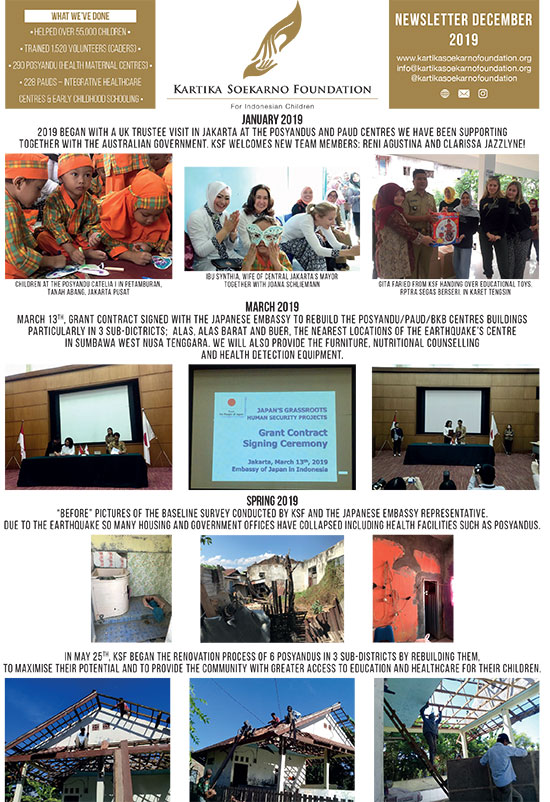
2019 began with a UK trustee visit in Jakarta at the posyandus and Paud centres we have been supporting together with the Australian government. KSF welcomes new team members: Reni Agustina and Clarissa Jazzlyne!
Download the newsletter as a PDF

This year, KSF has achieved great results in boosting the quality of basic education in East Java, helped reduce the high rates of infant mortality, young child malnutrition and ill health in the poorest parts of Eastern Indonesia. Our ethos of engaging local governments to fund and replicate our model ensures an organic national development. Peace and Joy for 2019.
Download the newsletter as a PDF
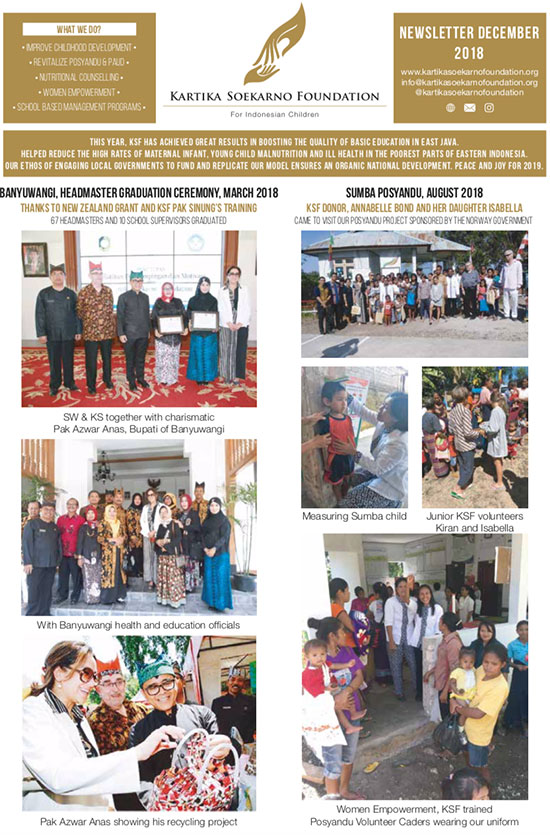
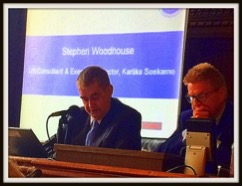
Stephen Woodhouse OBE addressing the panel
KSF is proud to share the news that KSF’s Executive Director, Stephen Woodhouse, was invited to speak at the Annual Commonwealth Day Seminar at the House of Lords about the role of education in emerging economies.
Stephen chose to highlight KSF’s success in local communities with their bi-focal approach of safeguarding early childhood health and optimising schools with KSF teacher training.
Although Indonesia is not part of the Common Wealth, the audience as well as the panel was eager to hear about the KSF approach and to discuss the possibilities of emanating this formula.
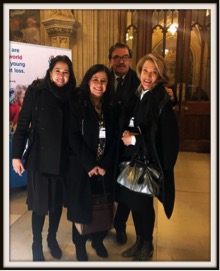
Celebrating KSF at Commonwealth Day at the House of Lords:
Founder Kartika Soekarno Seegers, Guest of Honour, Ms Hana Satriyo, who has recently arrived in London with her husband Ambassador Rizal Sukma, and Trustees Brian Sanderson and Joana Schliemann.
2015 brought KSF new government grants from Australia and the Kingdom of Norway. Thanks to their support, we will expand our posyandu revitalization programs (local community centres for early childcare, health and nutrition) in the poorest areas of Jakarta and West Sumba.
2 years program from 2015 to 2017, Central Jakarta.
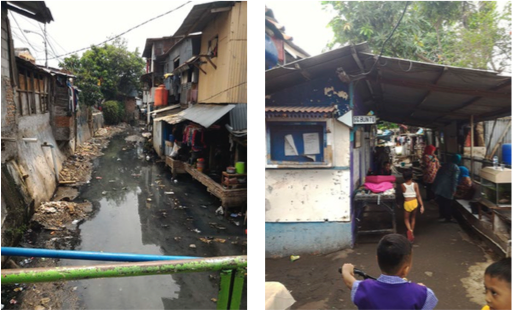
Visit to Posyandu Nusa Inda, located in central Jakarta. This village Kebon Melati is the home for 800 families in an area of not more than 16,000 sq metres.
2 year program from 2015 to 2017, West Sumba

Stephen Woodhouse meeting with the local Cadres in Katamawee village, East Nusa Tenggara. These ladies are volunteers working in the maternal health centers. Their knowledge in health and nutrition is still very limited. It will be Sari’s goal to change this, so that many young mothers and babies will benefit. The cadres capacity and community knowledge about nutrition and healthcare are still low.
99% of rural pregnant women are malnourished and anemic, thus resulting in weak body conditions and low birth- weight babies. Many of these babies die of dehydration from diarrhea and diseases.
We will have the full cooperation of the local authorities to tackle this dramatic malnutrition issue and to improve early health and education for young mothers, babies and children. Our pilot projects are selected by the area with the highest level of malnutrition and rates of maternal and infant diseases. The Norwegian Embassy in Indonesia is already working in Sumba to improve the electric outreach for this remote, poor and dry island.

KSF members working with the local government of cials in resolving health, nutrition and early childcare of mother and children issues through the Posyandu Revitalisation program.
Teacher training program in primary schools in Surabaya.
Thanks to the generosity of the Government and people of New Zealand, KSF has been able to initiate a program to improve learning outcomes in more than 200 primary schools serving in excess of 50.000 primary school age +children from low income families in Surabaya. The main focus is to equip school heads with the necessary knowledge and skills to promote better links with and support from local community leaders and parents; to manage schools in a more transparent and learning results oriented manner and to strengthen teachers capacities to promote a child focused learning paradigm. There is strong involvement of local Government such that we expect that KSF pioneering interventions will lead to full replication using funds managed by Government and other donors.
As you can see KSF has been very active over the last few years and we are very grateful to Japan for their continued support in the area of Gianyar.
Next March, I will visit all the projects sponsored by our “blue chip” government donors. We appreciate ongoing support from individual philanthropists and look forward to their even greater support in 2016 and beyond.
Download the newsletter as a PDF
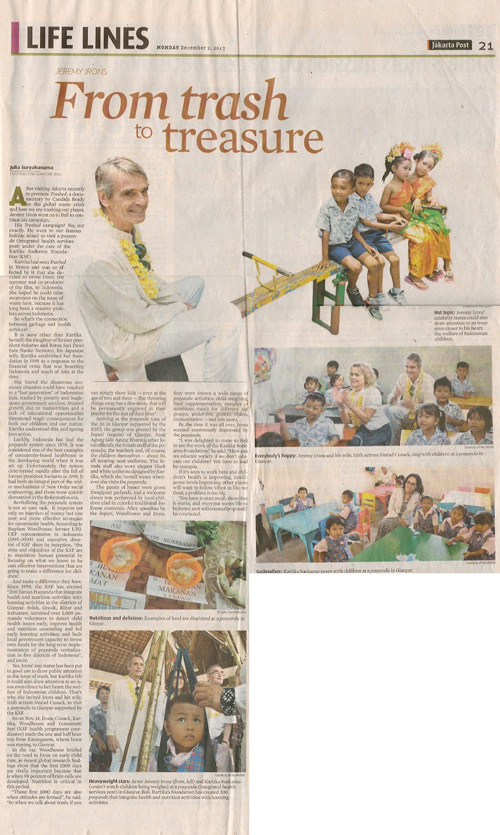
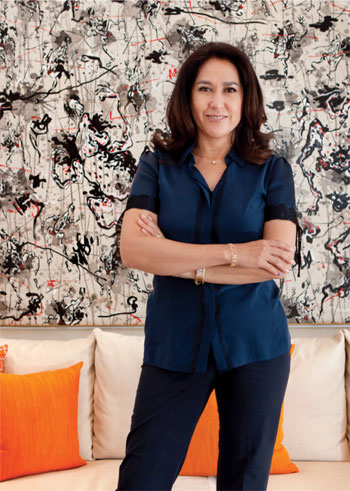
Kartika Soekarno — daughter of former President Sukarno and his Japanese wife Naoko Nemoto, known as Ratna Sari Dewi—was once banned from entering Indonesia. His successor President Suharto also did not allow Sukarno’s children to meet their late father. This political pressure apparently deeply impressed and made the young Kartika want to return to the country even more.
She is now living in Jakarta and actively supporting more than 200 posyandu — an abbreviation for pos pelayanan terpadu, a child and maternal clinic —in Java, Bali and Sumatra to help fight for malnutrition, one of the largest infant problems in Indonesia. According to the government, eight million babies and toddlers are malnourished. Through her Kartika Soekarno Foundation (KSF), she has channeled $117,000 of the Japan government’s funds last year to improve the clinics’ service and revitalize 49 posyandu.
“We have trained about 1,000 volunteers, and also provide basic healthcare such as immunization for expectant mothers, babies and toddlers. The ages zero to five is a crucial time for children to get good nutrition because of the impact on their health and brain development,” says Kartika who founded KSF in New York 16 years ago.

Kartika is a role model for independent women. She sometimes travels alone to the locations to visit her projects, from a small town of Solok in West Sumatra to Gianyar in Bali. She says the volunteers who work for the posyandu always impress her.

Her interest in posyandu started after she visited several clinics in Subang, West Java, in September 1999. Kartika, who at the time lived in New York, was a member of the U.S. National Committee for Unicef. Later she returned to observe clinics in a slum area of Jakarta for the same project. Together with a Dutch top model Annette Lauer, she raised hundred of thousands of dollars for this healthcare project.
As a prominent figure, Kartika can help raise money for charities. For example, she helped Unicef raise $180,000 through a charity event to fund the improvement of education for Indonesian children in remote areas. Currently, she is a member of the American Foundation of Venetian Heritage, which organizes the Venice Art Biennale, and collects funds for the architectural restoration of the city.
Last year, she brought English actor Jeremy Irons to Jakarta and Bali to visit the posyandu while also promoting Irons’ environmental documentary film “Trashed” in 39 cities in Indonesia. The film talks about global waste, and features Jakarta’s Ciliwung River and Bali’s beaches as examples of global pollution. “It’s an important message for Indonesia as there is a difficult situation with the trash here,” she says.
During her childhood, Kartika grew up living in many countries. She was born in Tokyo 47 years ago. Although she is an Indonesian citizen, her mother lived in Paris and Switzerland because of the un- certain political conditions in Indonesia. She doesn’t speak Indonesian fluently; instead she is able to speak English, French and Japanese well. Like her mother, she loves fashion: some of her favorites are Prada, Dries Van Noten and Gucci.
After the death of her father in 1970, she was able to visit Jakarta and sometimes stayed in her stepmother’s house, Hartini Soekarno, or her half sister’s, former President Megawati Soekarnoputri. Kartika has a very close relationship to Megawati, who witnessed her wedding to a Dutch banker Frits Frederik Seegers, now chief executive of Chairul Tanjung’s CT Corp., in Amsterdam in 2005.
“Mbak Mega is a person that I admire. She can act either as a good mother, a politician or as a leader,” says Kartika. Although most of Sukarno’s children are involved in politics, Kartika feels more comfortable as a social activist. Her philanthropy roots go back to a U.S foundation she supported to help the homeless in New York. Before, she was a TV journalist in Tokyo. In 1998, when Indonesia was hit by the financial crisis, she established her own foundation, KSF, with support from Unicef and CARE.
“Jakarta has changed. There are many ultra rich families here, while the middle class is also growing. But, in the other places, there are still people who need help. That’s why our efforts are with children from poor families, to help them have a good education and health,” she says.
In education, KSF has prevented more than 1,900 students from dropping out. It also trained hundreds of teachers in 75 primary schools in Gianyar, Blitar, Kebumen, Trenggalek and Solok. Her foundation also provides scholarships for secondary students to continue their studies at vocational schools. “We also provided grants for schools because the teachers sometimes are not very well paid or not motivated, so we train them to improve the quality of education. When children enjoy going to school, more children can be saved from dropping out,” she says.
Kartika funds her foundation with grants from the Japanese government and other international donors, as well as from private and corporate donations, such as from Freeport, Citibank and BCA.
Leaving London at the cusp of summer behind, I packed up and joined my friend Kartika in Jakarta to go on a fact finding mission and do some idea plotting for her Kartika Soekarno Foundation. I have always loved this archipelago of more than 16.000 tropical islands sprinkled along the equator. I connected with Indonesia a long time ago, in the seventies, when I learned how to swim at the Kartika Plaza Hotel and tried my own version of temple dancing at Borobudur with my sister, who came to us from Manado.
Indonesia is a kaleidoscope of hundreds of different cultures with its courteous, spiritual, yet eccentric and charismatic people, united into a hub of multiculturalism. It seems this diverse island state is confidently zigzagging towards a complex, democratic, 21st Century nation.
As a newly appointed trustee of KSF, I better acquaint myself with the ‘new’ Indonesia and gather some on-the-ground facts and local intelligence.
Here I am, on a field trip to buzzing, rumour breeding, pre-election Jakarta and a 24-hour stint to Surabaya. I cannot wait to delve into this manic momentum, just before this fourth most populous nation goes to the polls. I have tried to get the gist of Jakarta’s politicking, but despite my self-prescribed daily doses of Jakarta Post and relentless quizzing of Jakartavites, I did not manage to see through the gossip jungle and short lived alliances, that get cut like lianas overnight.
Jakarta has mushroomed into a vast and vibrant metropolis, dominated by a new generation of glam, success-hungry hipsters that even the perpetual asphyxiating traffic disaster cannot hold back. In swanky restaurants and bars they talk about pollution and education, as the elite in all global capitals does, but this does not yet translate into action for the wider public, especially not beyond the expanding city limits of Jakarta.
That’s why last November, Kartika, together with Erasmus House, had initiated a major screening of the film ‘Trashed’ with Jeremy Irons attending, to get the debate going. A jump-start initiative, which also included a new awareness campaign at the KSF Posyandus, to get the kids on the right track: Get rid-off the plastic epidemic, cut the stinging smog and ban garbage abuse.
Besides pollution, there is another sore issue in Indonesia: Education, the Raison d’être for the formation of KSF with the purpose to instigate and imply change on the school front. A humble contribution towards a prosperous and democratic Indonesia of the future. At the moment the average Indonesian child attends school about six years only and the quality of teaching is of sub-ideal standard. So KSF has launched a teacher training programme to remedy the status quo.
Author: Joana Schliemann
After spending a couple of revelatory days in Jakarta, where Kartika had introduced me to the most intriguing set of characters, a palette of opinion leaders with different perspectives and expertise: Indonesian activists and influential thinkers, diplomats, strategists, as well as local business people, many of them proper ‘Power Ibus’, it was now time to venture out for new KSF initiatives. Off to Surabaya, second largest city in Indonesia and the capital of East Java.
Kartika’s friend Karim Raslan had organised an impressive itinerary: Among other Surabayan personalities, he had arranged encounters with the two most outstanding Power Ibus: Ibu Risma, famed Mayoress of Surabaya and Ibu Nani of the Jawa Pos. We almost perished en route: Heart arrest – caused by nearly missing our flight due to the endemic traffic situation in Jakarta. Just to make sure our hearts would not rest, our cheeky driver, who had picked us up at the state-of-the-art Surabaya airport, decided it was more efficient to drive against the one-way, two lane carriageway. Along with the sun set we arrived at the HQ of Graha Pena and the Jawa Pos. We were greeted by a hoard of photographers and the striking, dynamic Über-Ibu Nani, visionary and activist, who helms the PT Jawa Pos Holding. Ibu Nani whisked us through her various news rooms, all equipped with a gym and fridges for breast milk.
An impressive crowd of young reporters and journalists, as well as the Chief of News Coverage, Pak Arif Santoso, guided us through the 200-local-newspapers producing publishing powerhouse. I was struck by the reporters’ involvement with each paper’s respective local community. Striving to make a change and improve the lives of their readers, Jawa Pos launches pragmatic programmes from child rearing courses to accounting. There is something for everybody, especially for the hard-to-please youth.
Besides Kartika and me, the KSF team was represented by Juliarty Soejarman Masson, KSF’s fairy-like Operations Manager, as well as chivalrous Pak Budy Sutanto, a Co-Trustee and old chum of Kartika’s.
Ibu Nani had invited us to join her and the JP correspondents for a sumptuous buffet of Javanese specialities, which was followed by an informal press conference in the board room. A frank and open ‘Q and A’ session followed Kartika’s introductory presentation of KSF. There was amiable laughter, candidness and an instantaneous connection over a range of social issues:
Empowerment of women, accessible health, the urgency of environmental awareness and governmental transparency.
It also emerged that the Jawa Pos is hosting a Posyandu Festival, and spontaneously invited Kartika and KSF to participate. What an ideal platform for KSF. In fact, it was jokingly agreed, Kartika could become the official Ambassadress of Pasyandus.
The concept of the Posyandu is actually an intrinsically Indonesian, genial tradition.
I had visited my first KSF Posyandu two years ago in Gianyar, Bali, to check out how they operate. My family and I were welcomed in a truly stately manner. To see a Posyandu in action was an eye-opener: Zesty KSF trained lady volunteers, dressed in their smart uniforms, rolled up their sleeves and helped young families and their children. Assisting with all matters on health and nutrition, the KSF Posyandus are also providing early learning tools, expertise and facilities. What an asset to have these angel volunteers pop up and serve the village community.
Author: Joana Schliemann
Our Surabaya evening was destined to turn into a rather late night. After the Jawa Pos, we crossed town to visit the compassionate compound of Ustadz Khoiron Syu’aib and his capable wife, Ibu Raudlotul Jankaroti. The Taman Pendidikan Islam is situated in the middle of the former entertainment district of Bangunsari. This amusement quarter used to be packed with brightly lit karaoke bars blasting top hits across the streets and shady dancers roaming the dark alleyways.
Although this has recently changed, due to the grip of Ibu Risma’s reign, there are still needy and vulnerable women and children, remnants from those days of profligacy, typical of a port city.
The Ustadz’s legendary institution is an oasis of hope and peace, set up with the purpose to show and teach the lost souls of Bangusari the essence and compassion of Islam.
The Ustadz himself was attending a seminar in another province, so Ibu Raudlotul showed us around her tranquil compound and offered us delicacies from her kitchen.
Intrigued by the harmony of this place, we wanted to explore further the roots of Javanese Islam in Surabaya. Ibu proposed an impromptu pilgrimage to the holy site of the Sunan Ampel Cemetery. This was the tomb of one of Java’s early missionaries from the Middle East, the holy Sunan Ampel, the spiritual force behind Java’s first Islamic Kingdom, who passed away in 1481.
Author: Joana Schliemann